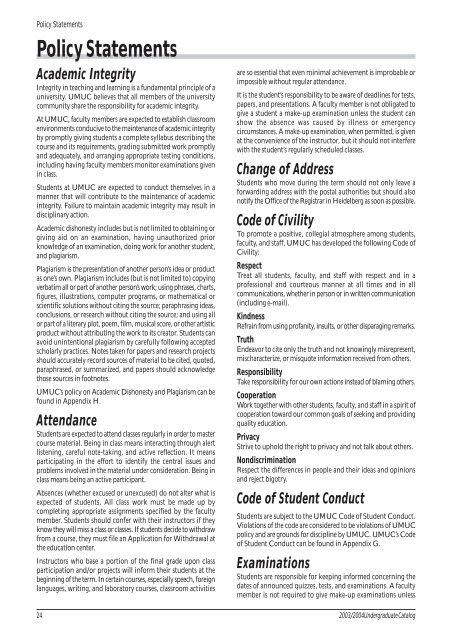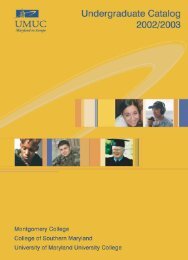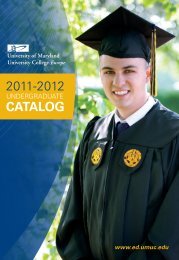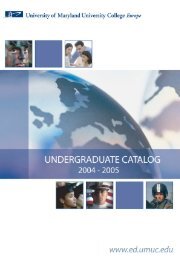Undergraduate - UMUC Europe
Undergraduate - UMUC Europe
Undergraduate - UMUC Europe
Create successful ePaper yourself
Turn your PDF publications into a flip-book with our unique Google optimized e-Paper software.
Policy Statements<br />
Policy Statements<br />
Academic Integrity<br />
Integrity in teaching and learning is a fundamental principle of a<br />
university. <strong>UMUC</strong> believes that all members of the university<br />
community share the responsibility for academic integrity.<br />
At <strong>UMUC</strong>, faculty members are expected to establish classroom<br />
environments conducive to the maintenance of academic integrity<br />
by promptly giving students a complete syllabus describing the<br />
course and its requirements, grading submitted work promptly<br />
and adequately, and arranging appropriate testing conditions,<br />
including having faculty members monitor examinations given<br />
in class.<br />
Students at <strong>UMUC</strong> are expected to conduct themselves in a<br />
manner that will contribute to the maintenance of academic<br />
integrity. Failure to maintain academic integrity may result in<br />
disciplinary action.<br />
Academic dishonesty includes but is not limited to obtaining or<br />
giving aid on an examination, having unauthorized prior<br />
knowledge of an examination, doing work for another student,<br />
and plagiarism.<br />
Plagiarism is the presentation of another person’s idea or product<br />
as one’s own. Plagiarism includes (but is not limited to) copying<br />
verbatim all or part of another person’s work; using phrases, charts,<br />
figures, illustrations, computer programs, or mathematical or<br />
scientific solutions without citing the source; paraphrasing ideas,<br />
conclusions, or research without citing the source; and using all<br />
or part of a literary plot, poem, film, musical score, or other artistic<br />
product without attributing the work to its creator. Students can<br />
avoid unintentional plagiarism by carefully following accepted<br />
scholarly practices. Notes taken for papers and research projects<br />
should accurately record sources of material to be cited, quoted,<br />
paraphrased, or summarized, and papers should acknowledge<br />
those sources in footnotes.<br />
<strong>UMUC</strong>’s policy on Academic Dishonesty and Plagiarism can be<br />
found in Appendix H.<br />
Attendance<br />
Students are expected to attend classes regularly in order to master<br />
course material. Being in class means interacting through alert<br />
listening, careful note-taking, and active reflection. It means<br />
participating in the effort to identify the central issues and<br />
problems involved in the material under consideration. Being in<br />
class means being an active participant.<br />
Absences (whether excused or unexcused) do not alter what is<br />
expected of students. All class work must be made up by<br />
completing appropriate assignments specified by the faculty<br />
member. Students should confer with their instructors if they<br />
know they will miss a class or classes. If students decide to withdraw<br />
from a course, they must file an Application for Withdrawal at<br />
the education center.<br />
Instructors who base a portion of the final grade upon class<br />
participation and/or projects will inform their students at the<br />
beginning of the term. In certain courses, especially speech, foreign<br />
languages, writing, and laboratory courses, classroom activities<br />
24<br />
are so essential that even minimal achievement is improbable or<br />
impossible without regular attendance.<br />
It is the student’s responsibility to be aware of deadlines for tests,<br />
papers, and presentations. A faculty member is not obligated to<br />
give a student a make-up examination unless the student can<br />
show the absence was caused by illness or emergency<br />
circumstances. A make-up examination, when permitted, is given<br />
at the convenience of the instructor, but it should not interfere<br />
with the student’s regularly scheduled classes.<br />
Change of Address<br />
Students who move during the term should not only leave a<br />
forwarding address with the postal authorities but should also<br />
notify the Office of the Registrar in Heidelberg as soon as possible.<br />
Code of Civility<br />
To promote a positive, collegial atmosphere among students,<br />
faculty, and staff, <strong>UMUC</strong> has developed the following Code of<br />
Civility:<br />
Respect<br />
Treat all students, faculty, and staff with respect and in a<br />
professional and courteous manner at all times and in all<br />
communications, whether in person or in written communication<br />
(including e-mail).<br />
Kindness<br />
Refrain from using profanity, insults, or other disparaging remarks.<br />
Truth<br />
Endeavor to cite only the truth and not knowingly misrepresent,<br />
mischaracterize, or misquote information received from others.<br />
Responsibility<br />
Take responsibility for our own actions instead of blaming others.<br />
Cooperation<br />
Work together with other students, faculty, and staff in a spirit of<br />
cooperation toward our common goals of seeking and providing<br />
quality education.<br />
Privacy<br />
Strive to uphold the right to privacy and not talk about others.<br />
Nondiscrimination<br />
Respect the differences in people and their ideas and opinions<br />
and reject bigotry.<br />
Code of Student Conduct<br />
Students are subject to the <strong>UMUC</strong> Code of Student Conduct.<br />
Violations of the code are considered to be violations of <strong>UMUC</strong><br />
policy and are grounds for discipline by <strong>UMUC</strong>. <strong>UMUC</strong>’s Code<br />
of Student Conduct can be found in Appendix G.<br />
Examinations<br />
Students are responsible for keeping informed concerning the<br />
dates of announced quizzes, tests, and examinations. A faculty<br />
member is not required to give make-up examinations unless<br />
2003/2004<strong>Undergraduate</strong> Catalog






